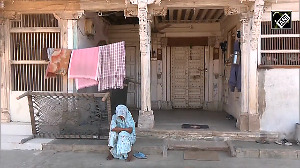
The grand plans to reopen the Nathula Pass linking Sikkim and Tibet have been put off by at least a year owing to security concerns.
The decision to reopen the pass, announced with much fanfare in 2003 during then prime minister Atal Bihari Vajpayee's Beijing visit, appears to have been put on the backburner by the new United Progressive Alliance government following objections raised by the Indian army and concerns over the lack of trade infrastructure at Nathula.
The decision to reopen the pass was also seen as de facto Chinese recognition of Sikkim as a part of India.
Vajpayee's China Tour: The Complete Coverage
Although no one is willing to comment officially on the reasons for the postponement, the Eastern Army Command, more specifically, the Siliguri-based XXXIII Corps, had drawn the government's attention to the construction of two new parallel roads opposite Nathula Pass by China's People's Liberation Army.
The Chinese are also upgrading the existing road into a two lane and hard metal one, capable of carrying heavy armour, which the Eastern Command believes will give a major military edge to the Chinese in the eastern sector.
Last month, Sikkim Chief Minister Pawan Chamling, a strong proponent of resumption of trade between the two countries through Nathula, announced that 'the trade through the pass is likely to take one more year to start.' Prime Minister Manmohan Singh had told him that that the pass would be reopened only next year, as all the issues relating to trade agreement had to be reviewed, he said.
Barely 54 km from Gangtok, the capital of Sikkim, Nathula is located at 15,000 feet (4,500 meters) above sea level. "Our main emphasis initially will be on improving infrastructure. The road link has to be strengthened. We are considering various options for improving the roads and are also looking at possibilities of new alternative routes to Nathula," Chamling said.
This main pass -- through which trade was traditionally conducted between Tibetans and Indians -- was closed in 1962 following the outbreak of the Sino-Indian war.
The decision to reopen it following Vajpayee's visit to China last year had enthused the region, with Sikkim and neighbouring West Bengal planning a joint strategy to take advantage of the new opportunity. The twin cities of Jalpaiguri and Siliguri in West Bengal would be the main hubs once the pass is reopened.
Business worth Rs 500 cr expected through Nathu La
The West Bengal government has asked the Siliguri-Jalpaiguri Development Authority to look into areas that need improvement. In the short term, customs, warehousing, storage and freight handling infrastructure will have to be developed.
The opening of the route is also likely to benefit Chinese traders. This traditional Silk Route is the shortest between the two countries. The Tibetan town of Yatung is just 52 km away from Nathula, and Lhasa only 525 km away. The Kolkata and Haldia ports would give China easy access to the Bay of Bengal, allowing it to step up trade with other South Asian countries.
It is advantage China, says expert
Sikkim has identified 29 items of export through Nathula. They include agricultural inputs, blankets, tea, coffee, clothes, textiles, watches, shoes, canned food, tobacco, rice, and dry fruit. From Tibet items like goat skin, sheep skin, sheep wool, raw silk. yak tail, china clay, goat wool are likely to be imported into India.
The reopening of the pass will also be a boon to the tourism sector. To reach Mansarovar by car through Nathula will take just two days, compared to the 15 days it now takes. "Lakhs of tourists from both sides will be benefited," said tour operators in Gangtok.






 © 2025
© 2025